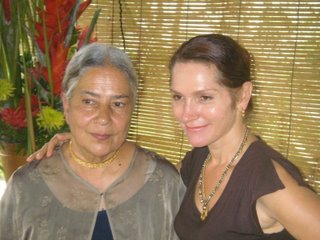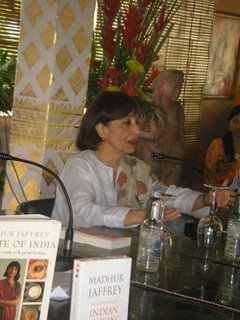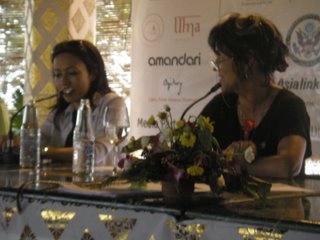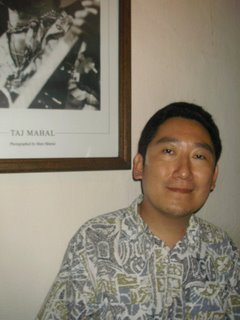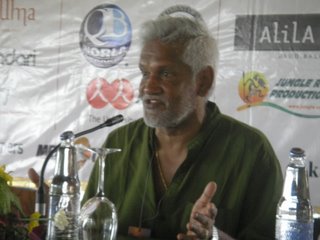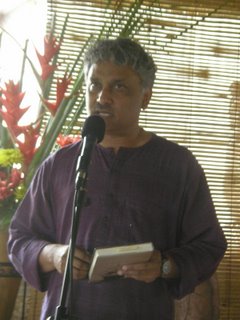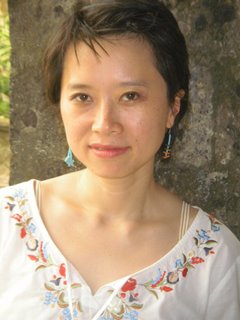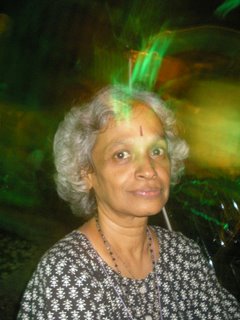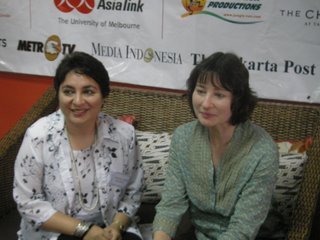Then, after lunch and a quick rush round the supermarket to get survival rations for the afternoon with Chet's help, dashed over to Seksan's and the heaven's opened.
I was drenched even before I had unpacked the car, and the inclement weather didn't let up the whole afternoon. (What is happening to the weather? It doesn't seem like the monsoon ever went away?) But fortunately our loyal audience turned up in decent numbers. (Thank you!)
Wena Poon read a passage from her story
The Shooting Ranch, my favourite story from
Lions in Winter. Again, it was beautifully dramatised, and really showed how much she gets into the skin of her characters to write about them. (Not all authors - even some very big name ones - are good readers of their own work!)
Wena sadly had to rush off early as she had another appearance at Borders. I'm so glad she came, but sorry we couldn't have arranged better weather for her.
Animah Kosai (above right) dragged friends Dina Zaman (above left) ...
... and actor Na'a Murad (here getting his photo taken by a member of the press) along to read a couple of scenes from a new play she's working on called
100 Stones, which featured a woman married to a guy who has just become an elected representative. He doesn't seem to be too interested in sex, and there she is, desperately frustrated trying to seduce him with every trick in the book including sexy negligees.
It was interesting talking to Na'a in the break who reckons that the changed political landscape and the greater openness and willingness to engage in issues that has followed, is making it easier for artists of all kinds, but especially playwrights. It's early days yet ... but really, let's hope he's right.
I've been looking forward to
Sufian Abas' first book for a very long time ... ever since we both got out first short stories published in Silverfish New Writing 1, in fact.
Kasut Biru Robina is a collection of short shorts, some short short shorts just a few lines long. Bite size and snackable.
Sufian read a piece called
Malam Mailakat Tidur (The Night the Angels Slept), and modest chap that he is, was going to end there but we encored him back for a second piece -
Kisah Cinta (Love Story), a very amusing little tale about the fickleness of women.
Priya K. made an
appeal for funds for the forthcoming Malaysian-UK exchange project, and illustrator
Shahril Nizam brought some of his pictures along to be auctioned. The bidding is still ongoing and I'll post more about this later.
The break was extra long because the rain overhead was nosiy, but no-one seemed to mind too much as they were busy partying, networking, selling books ...
Ted Mahsun read a story,
Pak Sudin's Bicycle I'd read on an e-group earlier and liked very much. He read it for the first time at
Kata Suara the other week and had been surprised at how well it had gone down with the audience. Ted's writing is warm and whimsical, and it's really nice to see him developing as a writer. (He has
a review of the new Stephen King book in the
Star today, by the way.)
George Wielgus, poet, performer and writer describes himself as :
... a refugee from the wastelands of suburban England.
Slipping into the persona of her alter-ego, Mighty Jah-J, he gave us some hard-hitting poems, including
Liberation and
Death No. 1, which left us in little doubt why he had won
the last KL Poetry Slam.
He was also selling his recently self-published limited edition zine for the price of a teh tarik (cup of "pulled tea"). You can read his poem
Inside-Outsiders here.
We ended with a short tribute to Lloyd Fernando who passed away recently, and Priya K. read an extract from
Green is the Colour.
Thanks : to all those who braved the rain, those who read, those who sold books, those who auctioned art, those who helped set up and put away and wash glasses, Shahril Nizam who designed the blogposter, and of course Seksan for the use of his beautiful space and the stunning visual backdrop provided by the current exhibition.
Our next readings is on April 19th and among the writers appearing will be author
Kunal Basu.
 And of course he talked about the making of the film of his short story The Japanese Wife with director Aparna Sen which will start doing the rounds of the film festivals next month, and be on general release in October. It is a true piece of world cinema, filmed in English, Bengali and Japanese, and by the miracle of YouTube I managed to find this news item about it :
And of course he talked about the making of the film of his short story The Japanese Wife with director Aparna Sen which will start doing the rounds of the film festivals next month, and be on general release in October. It is a true piece of world cinema, filmed in English, Bengali and Japanese, and by the miracle of YouTube I managed to find this news item about it : 


